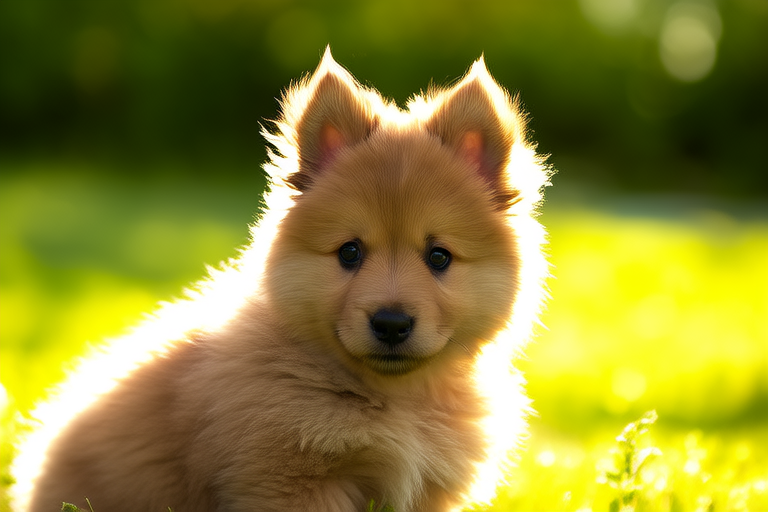Top Tips for Raising a Happy and Healthy Pomeranian Puppy
Raising a Pomeranian puppy can be an incredibly rewarding experience. These small, fluffy dogs are known for their intelligence, loyalty, and playful nature. However, to ensure they grow up to be happy and healthy, it’s important to provide them with the right care from the very beginning. This article will cover essential care guidelines for your Pomeranian puppy, including nutrition, exercise, grooming, training, socialization, common health issues, and creating a stimulating environment.
Nutrition: The Foundation of Your Pomeranian’s Health
Proper nutrition is crucial for the growth and development of your Pomeranian puppy. It’s important to feed them high-quality dog food that meets their specific nutritional needs. Look for food that contains real meat as the primary ingredient and avoid products with fillers or artificial additives.
Consult your veterinarian about the best diet for your puppy. They may recommend a specific brand or suggest home-cooked meals. Regardless of what you choose, always ensure that your puppy has access to fresh water at all times. As they grow, adjust their portion sizes accordingly to prevent overeating, which can lead to obesity.
Exercise: Keeping Your Pomeranian Fit and Happy
Pomeranians are active and energetic dogs that require regular exercise to stay healthy. Despite their small size, they need daily physical activity to maintain muscle tone and prevent behavioral issues. Short walks, playtime in the yard, and interactive toys can help meet their exercise needs.
Be mindful of their exercise duration, especially during hot weather or when they are young. Over-exercising can cause joint problems due to their delicate frame. Always monitor their energy levels and stop if they show signs of fatigue. Additionally, mental stimulation through puzzle toys and training sessions can also contribute to their overall well-being.
Grooming: Maintaining Your Pomeranian’s Appearance and Health
Grooming is an essential part of caring for your Pomeranian puppy. Their thick double coat requires regular brushing to prevent matting and tangling. Brush them several times a week, more frequently during shedding seasons. Bathing should be done every few months or as needed.
Trimming their nails regularly is also important to prevent discomfort and injury. Check their ears weekly for any signs of infection or debris and clean them gently if necessary. Teeth brushing should be part of their routine to maintain good oral hygiene. Establishing a grooming routine early helps your puppy get used to these activities, making the process easier for both of you.
Training: Teaching Your Pomeranian Good Behavior
Training is key to ensuring your Pomeranian puppy grows into a well-behaved adult dog. Start training as soon as you bring your puppy home, focusing on basic commands like sit, stay, come, and down. Positive reinforcement methods, such as treats and praise, work best for this breed.
Consistency is vital in training. Use the same command words and rewards each time you train your puppy. Avoid harsh punishments, as they can damage your relationship with your pet. Enroll in obedience classes if possible; they offer structured learning environments and opportunities to socialize with other dogs.
Socialization: Helping Your Pomeranian Adjust to the World
Socializing your Pomeranian puppy is crucial for their emotional development and future behavior. Expose them to various people, animals, and environments while they’re still young to help them become comfortable and confident in different situations.
Begin socialization around eight weeks old and continue until they’re about six months old. Gradually introduce them to new experiences, such as car rides, visits to the park, and meeting strangers. Always supervise interactions with other dogs to ensure safety and positive experiences. Socialized puppies tend to be friendlier and more adaptable as adults.
Common Health Issues: What Every Owner Should Know
Pomeranians are generally healthy dogs, but they are prone to certain health conditions. Some common issues include dental disease, luxating patellas (dislocated kneecaps), hypothyroidism, and tracheal collapse. Regular veterinary check-ups can help catch these problems early and manage them effectively.
Keep an eye out for signs of illness, such as changes in appetite, unusual lethargy, or difficulty breathing. Early detection and treatment are critical for maintaining your puppy’s health. Discuss potential genetic predispositions with your breeder before purchasing a puppy. Genetic testing can identify carriers of hereditary diseases, allowing you to make informed decisions about breeding.
Creating a Stimulating Environment: Keeping Your Pomeranian Mentally Engaged
A stimulating environment is essential for keeping your Pomeranian mentally engaged and preventing boredom-related behaviors. Provide them with a variety of toys, including puzzle toys, interactive games, and chew items. Rotate their toys periodically to keep things interesting.
Consider incorporating enrichment activities into your daily routine, such as hide-and-seek games or scent work. These activities can help reduce stress and anxiety while promoting cognitive development. Ensure your living space is safe and secure, with no small objects or toxic substances within reach.
Conclusion: Enjoying the Journey with Your Pomeranian Puppy
Raising a happy and healthy Pomeranian puppy involves providing proper nutrition, exercise, grooming, training, socialization, and addressing common health issues. By following these guidelines, you’ll set your puppy up for success and enjoy many years of companionship together. Remember that every dog is unique, so adapt these tips based on your individual puppy’s needs and personality.
With patience, love, and dedication, you’ll create a strong bond with your Pomeranian and watch them grow into a confident, well-adjusted adult dog. Embrace the journey and cherish the moments shared with your furry friend.
